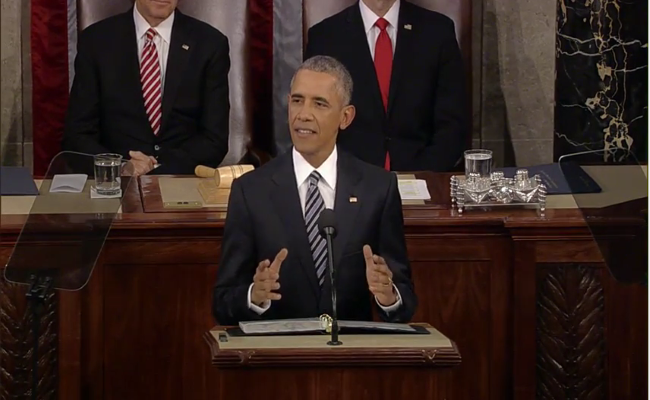In a fuzzy speech with plenty of sharp edges, the president asked Americans to believe in the change he’d brought.
By Edward-Isaac Dovere, Politico
Just at the moment when Hillary Clinton started tearing into Bernie Sanders’ warning that there’s no “magic wand” to fix Washington, President Barack Obama showed up for his State of the Union to brag about how well he’s waved his.
Just at the moment when the Republican primary candidates are out-glooming each other about the country and the world and the last seven years of this presidency, Obama spent an hour of prime-time television insisting that things are better than any of them thinks is true.
Arms on the podium, hands clasped, leaning into the microphone making swipe after told-ya-so swipe — he wasn’t waiting for vindication anymore. He was taking it for himself.
“I told you earlier all the talk of America’s economic decline is political hot air,” he said. “Well, so is all the rhetoric you hear about our enemies getting stronger and America getting weaker.”
Obama said “change” 20 times, but this was a speech about the “you can believe in” part of his 2008 campaign slogan. Come on, believe in it, Obama kept saying. There’s much to believe in: an improved economy, a foreign policy that’s broken through old problems and handling new ones, new laws that were controversial every step of the way but have changed lives.
The State of the Union address was the first of the “last”s for a president whom aides say is constantly talking these days about how rapidly he feels it all coming to a close. (“Let me look at this one last time,” he was overheard saying right before he left the House chamber after the speech.)
It was a campaign speech, but this campaign is to get people to feel they were right to believe in him eight years ago and should keep believing in it now.
“That’s the country we love — clear-eyed, big-hearted, optimistic that unarmed truth and unconditional love will have the final word,” Obama said, to wrap it up. “That’s what makes me so hopeful about our future. Because of you. I believe in you. That’s why I stand here confident that the State of the Union is strong.”
In other words: Don’t blame him for Donald Trump. Don’t blame him for the divisiveness. Don’t blame him for the malaise, that there are still red states and blue states, that Congress won’t do anything, that there are more Republicans in Congress and elected all over the country than anywhere near the number when he first came in.
It was, as the president and his aides have spent a month predicting, a non-traditional State of the Union speech. But it was a totally traditional Obama speech, full of Abraham Lincoln and Martin Luther King Jr. quotes, aspirational lines written as if they were meant to be chiseled on walls.
He acknowledged the anxiety that Republican presidential candidates are tapping into, but mostly he acknowledged it to say that it’s wrong, or misplaced, or being manipulated by politicians for their own gain. He poked Paul Ryan with the only olive branch he offered to Hill Republicans, saying he knows the House speaker “has talked about his interest in tackling poverty,” and sure, “I’d welcome a serious discussion.”
He threw in the Elizabeth Warren code-word about a “rigged” economy. But the decisions he’s made, Obama have said, gave America the recovery — and as for the people who don’t feel the recovery, a lot of that has to do with “changes that started long before the Great Recession hit and haven’t let up.”
He said he wanted a politics where people could disagree with each other. But the vision he laid out for America was one where his way forward was the only one that made sense.
No one would rank this as one of Obama’s best speeches. It wasn’t expected to be. Obama and his aides see the State of the Union as a mostly predictable speech that generates mostly predictable, prewritten responses that rarely becomes an inflection point.
And for Obama, State of the Union speeches highlight, perhaps even more than his Oval Office addresses, how fickle he can be as a political performer —supernaturally electric when he feels called to the moment and energized by a crowd, as he was at the Democratic National Convention in 2004 and by mourners in Charleston last June who started cheering as soon as they saw him come in.
For all the White House’s behind-the-scenes downplaying of the speech, they worked hard to make this one break through, using every platforms they could, from Snapchat to the “Today” show. Many in Washington politics and journalism quickly dismissed Tuesday’s speech as a dud. But many of those same naysayers were similarly unimpressed with Obama’s Oval Office address in December that 46 million people watched,and which the White House credits in part for changing the political dynamic around his ISIL response. Close to 17 million people tuned in for his town hall on guns last week, which the White House feels shows how much Obama can drive the conversation, even now, even with the race to replace him very much underway.
Could he have done better working with Republicans, Obama asked?
“There’s no doubt a president with the gifts of Lincoln or Roosevelt might have better bridged the divide,” he said, “and I guarantee I’ll keep trying to be better so long as I hold this office.”
But there’s no question about how good he feels about beating them.
Noting that some members of the audience are candidates running to replace him, Obama joked at the start that he’d keep it short so they could get back to Iowa.
Then with a sarcastic smile: “I’ve been there. I’ll be shaking hands afterwards if you want some tips.”









